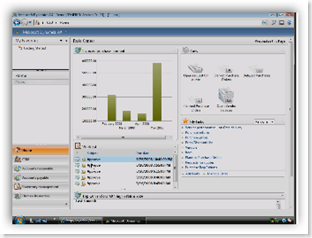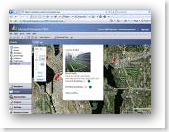Business Intelligence is something that no hospital can afford to be without today. A few years back, when I had approached a few organizations about entertaining this idea, it was not received well at all, mostly due to the fact that I had the same problem Harry Markopolos recently had, my audience didn’t understand the value and how it would analyze, create efficiencies, better healthcare and provide top management and others a convenient dashboard to see the status of affairs at the hospital at once. 
There are many approaches to a solution, but basically the desire is to aggregate and bring all the data from accounting, billing, administration, the clinical operation all under one roof and be able to create and view reports quickly, so that decisions, especially those that require a substantial amount of money can be analyzed properly. If not relying on business intelligence software, it’s a Chinese fire drill trying to combine information from various departments into an easy yet detailed format. Every department may have their spreadsheets, but that’s as far as it goes and to combine and create decision making information and reports also takes a huge amount of human, administrative time to compile. Some facilities though are all over it.
Business Intelligence in HealthCare – Aggregated Data at Harvard Medical Centers
Software that saves lives - Business Intelligence - one Neurologist discovers the secret...
Business Intelligence Applications for Specialty Healthcare Organizations
Using Business Intelligence to Bring out the Value of EHRs
Not too long ago I did an interview with Boston Desktop Software which does a great job with automating many functions in hospital accounting and other areas and is a bargain compared to several humans doing the automated work it accomplishes.
Boston Software Systems – Workflow Scripting Automation for Hospitals
Insurance companies are presently revising their present business models and business intelligence, and some of their business intelligence lead into some greed and lawsuits as perhaps the pendulum swung too far.
Other issues too in government agencies not having adequate and updated technology are in the picture too, like Social Security needing to upgrade from some very old COBOL technology.
There are quite a few related links with both hospital stories and helpful business intelligence information for healthcare below. BD
Healthcare organizations in the U.S. are suffering through a financial pandemic with a combination of fluctuating markets, rising costs, and less generous payments from insurers putting severe strain on healthcare providers. Hospitals and physicians clinics are squeezed on all sides – by insurance companies and Medicare, by patients wanting quality care but often unable to pay for it, by the high costs of medical equipment, drugs and supplies, and by the sheer bureaucracy needed to file claims, or deal with regulatory issues.
All of that paperwork, whether digital or pen-and-pencil, adds up. The administrative overhead at hospitals is significant – about 23% of total operating costs,3 Given that approximately one-third of U.S. hospitals are now operating in the red, with another third at just
breakeven, reducing administrative overhead and rooting out inefficiencies elsewhere is clearly critical.
Use of Business Intelligence Process, Technologies and/or Services Improves Performance
General administration and procurement.
Reimbursement.
Clinical care.
Lean Times Call for Low-Cost Approaches
Of course, along with the need to have BI tools in order to reduce costs and improve income is the growing availability of less expensive methods for obtaining BI – namely, software-as-a-service and outsourced services – which will help healthcare organizations to cost justify their BI projects.
2009 will be a year of many small, low-cost, certain ROI IT projects. But for those healthcare organizations that survive the quagmire of the next year or two, the next step will be to expand those modest-but-useful BI efforts into enterprise-wide implementations, with more complete integration between departments and more dashboards to serve up metrics and KPIs to financial executives, patient care managers, ER nurses and others that can benefit from fast access to key data.
BeyeNETWORK: Hard Times in Healthcare: Business Intelligence Provides Support
Related Reading – Business Intelligence for Healthcare



 breakeven, reducing administrative overhead and rooting out inefficiencies elsewhere is clearly critical.
breakeven, reducing administrative overhead and rooting out inefficiencies elsewhere is clearly critical.
0 comments :
Post a Comment